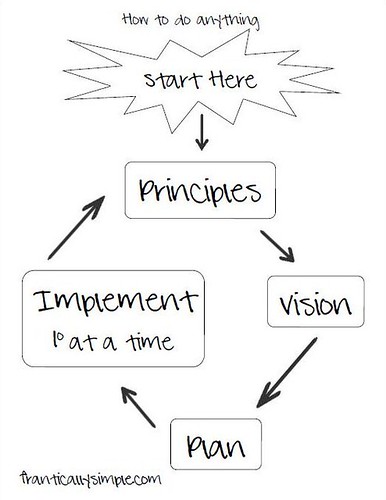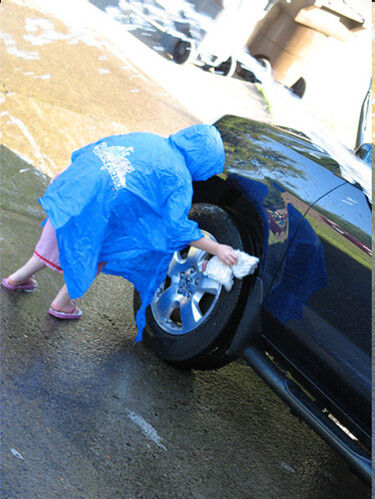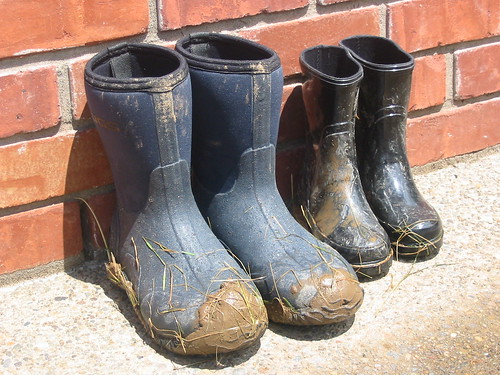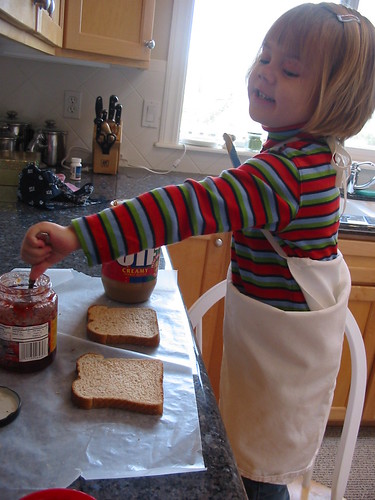See past posts in this series here:
Principles and Vision
If Mama Ain’t Happy, Ain’t Nobody Happy
Ever feel like your kids are allergic to work?
Symptoms: in the presence of work to be done, child breaks out in whining, lethargy, tears, stomping feet or running away. Their “symptoms” make you break out in a rash.

Hopefully, I will be able to share some things to help those allergies begin to clear up.
Remember our cycle?

You have learned the principles or the why behind the importance of family work.
You have begun creating a vision of your ideal.
You have examined your own feelings.
It’s time to start talking about The How (Planning and Implementation – 1° at a time).
I’ve learned that even a small shift in my thinking usually has a more powerful effect on my day-to-day life than any full-scale attempt at self-improvement. The same is true when it comes to raising children. Holding a vision of their best, true selves in my mind, I suddenly find that the picture has become a reality. We create our lives within our own imaginations well before we ever realize them here on earth. So I imagine what is possible and try to live my days mindfully, and with a sense of humor.
Katrina Kennison, “Mitten Strings for God: Reflections for Mothers in a Hurry
”
How can we motivate our children and help them to stay on task?

Teach the Basics
My friend once told me a funny story about her nephew. When Ryan was five, his family went on hiking on some newly built trails at a national park. They stood at the trail head and Ryan’s dad gave instructions:
I want everyone to look at this sign. It says that if you do not stay on the trail you could be fined $100. Everyone understand?
The kids all answered in the affirmative and set out for their hike. They hadn’t gone more than a dozen paces when the dad turned around and found Ryan off the trail. He called back his son and reminded him that they could be fined for leaving the trail. Once again, it seemed as though everyone understood, but once again, they set off and Ryan left the trail. This happened several times before Ryan’s dad lost it.
Ryan! I have told you time and time again to stay on this trail! Why won’t you listen to me?
With tears in his eyes, Ryan replied”
Dad, I want to find $100.
The difference between fined and find is so simple to us, but we have to remember that our children do not have the benefit of experience. Sometimes instructions that seem clear to us are confusing to a child. Don’t just say: pick up your toys. Show them how. Remind them where toys go. You may end up spending more time helping your child understand how to do the chore than if you had done it yourself. However, keep your vision in mind. Is your end goal a clean room, or a family that knows how to work together and enjoys doing it?

Expect Mistakes and Lower Your Standards to fit the Child’s Ability
When children are young, they love helping. If you are critical of the work they do, or come along behind them and “do it right”, what will that do to their enthusiasm? They may begin to see work as an opportunity to disappoint you.
How will you if your child is working to the best of their ability or merely doing a hurried sloppy job so they can get back to Spongebob? In our home, we have “inspections”. After completing our morning chores, my daughter and I inspect each other’s work. I have her go first. She takes a clipboard with a list of my morning chores around with her.
Mom, I see that you made your bed, but there are a few wrinkles in the middle. You need to fix that.
In your bathroom, you forgot to wipe the mirror. You’d better do that now.
And on it goes.
Let me tell you, this kid is exacting in her standards when it comes to the work that I have done – but that is exactly what I want. By showing me that she is capable of seeing my errors (some that I leave on purpose), I know what standard of work she is capable of. When I inspect her, I use the same standard that she has set. I check her bed for wrinkles or mirror for spots. And then, I may look just a tiny degree beyond what she has seen and say something like “I noticed that your sink has a pink ring around the drain. Let me show you how to clean it.” I learn what she can see, then teach her to see a bit more.
Let me be clear, there is no punishment here. No criticism or disappointment. This is a teaching opportunity. Once we have both passed inspection, we move on with whatever we have planned for the day.
One final note: if the child is not capable of doing the chore to your standards, ask yourself if you can allow them to do it their way for awhile while they learn, or if perhaps they are just not ready for that job yet. If they are not quite ready for it, can they watch you or do it alongside you while they learn?

Make Chores Easier for Your Child to Do
Here are some ideas on how to make chores easier for your children. If you have more suggestions, please leave them in the comments.
- Give your children their own laundry hampers. Consider scheduling a day for them to either bring their clothes to you to wash or, even better, use the laundry room themselves.
- Color code towels and washcloths so each child can recognize their own (and so you know who might be in need of some instructions about leaving towels on the floor).
- For younger children, move coat hooks and closet rods so they can be easily reached.
- Keep cleaning supplies in each bathroom. Safety Tip: 1 cup white vinegar to 1 gallon of water makes a great all purpose cleaner. Add a few drops of essential oils in your favorite scent if you like. Keep it in a spray bottle under the sink.
- In the kitchen, move safe utensils, dishes and snacks to a place children can reach. Invite (and teach) them to begin preparing snacks for themselves and other family members.
When I teach workshops on Family Work, I often get asked the following two questions:
Q: My child is [insert age of child]. What kinds of chores should he be doing?
A: I don’t know. All children develop at different rates. I will say, he is probably capable of doing more than he does now. I recommend reading with your family great books set in times past to get a picture of the work that children were required to do before these “modern times”. The Little House Series is great for teaching about hard work. Think about the things that Laura and Mary or Almanzo learned to do. I’m an adult, and I don’t work as hard as they did.
Another series (and my family’s current favorite), is the Little Britches series. Ralph was only eight years old when he got his first paying job, herding cows all day from horseback, by himself all summer long. Are the eight year olds I know capable of that? I don’t think so. But they have the potential to do big things, hard things, if they are taught how and trusted with the responsibility.
Q: How much work should my child be doing?
A: Same answer. I don’t know, but probably more than they are doing now. I have heard one chore per year of a child’s age as a rule of thumb – but of course there are a lot of variances in difficulty between different chores. One place to start figuring that out, is by looking at the family’s needs. What needs to be done? Who does it? Can the work load be distributed in a different way? Do you hire out any of your work (yard care/housekeeping)? Can the family take that responsibility back?
So much of training children to do anything and do it without “allergy symptoms” comes down to relationships. Are you able to stay calm when they make mistakes? What about when they choose not to follow your instructions? Is your family learning how to govern themselves?
Be sure to check back here on Tuesday. I have Nicholeen Peck, author of Parenting A House United: Changing Children’s Hearts and Behaviors by Teaching Self Governement, stopping in to teach us some of the very powerful principles that are contained in her book.
Hint: You may want to subscribe to my posts, so you don’t miss it.
RSS for a reader
Email delivery

Homework
Make a list of the chores you currently have your children doing. Are they doing them well? If not, do they need additional training?
Decide on 1-3 things you can do to make work easier for your children (example: lowering closet rods).
If you hire out house or yard work, calculate how much you spend per year. Talk to your family about that dollar amount. Make a wish list of other ways you might like to spend your money and post it somewhere visible. Don’t fire the housekeeper (unless you decide you really want to). Just let the thought of other ways that money could be spent percolate with your family.
Family Work Journal – Week 3 Free PDF Download
Your Turn
Did you write a post about kids and chores? Motivations? How you do it? Share it here. (Please place a text link to this post or a button on your post.) If you haven’t written one yet, links will be open all week.
If you are not a blogger, feel free to share in the comments or on Frantically Simple’s Facebook page.
Next week we’ll talk about chore charts and other motivators. If you have a great system or chore chart that you are not sharing today, get it ready. I’ll do another link-up then.
Disclaimer: Amazon Affiliate links are being used. If you purchase anything from my amazon links, I get a small commission. All opinions and text are my own.









